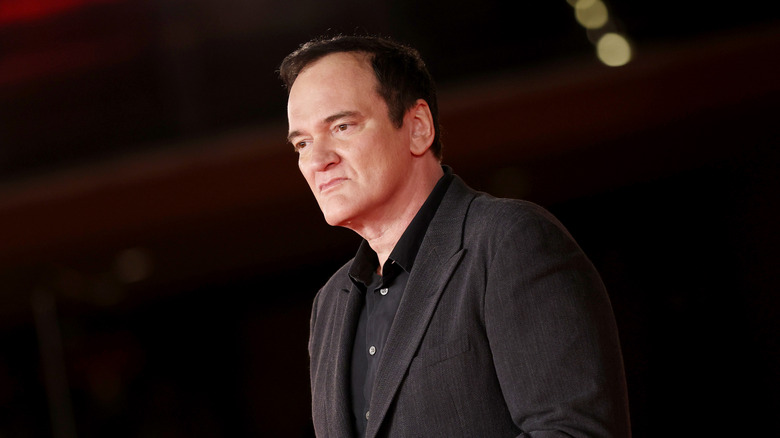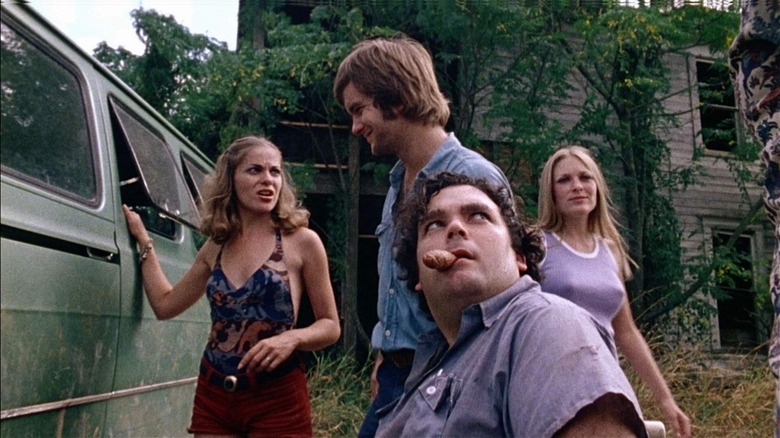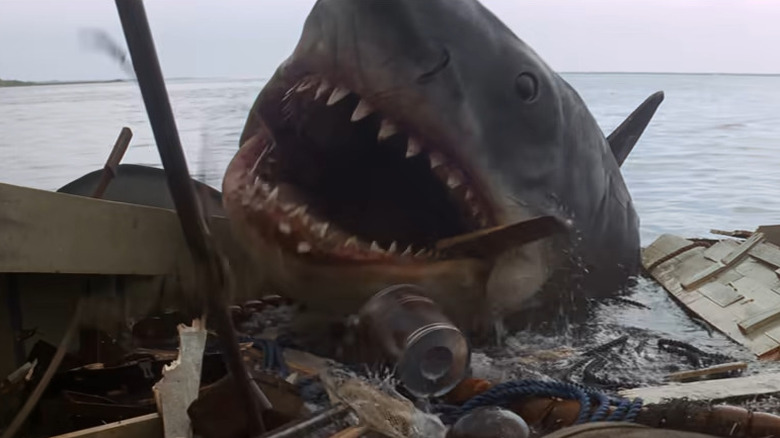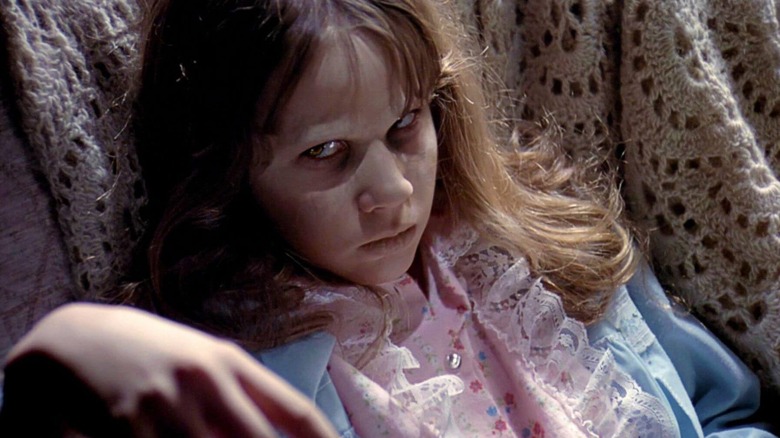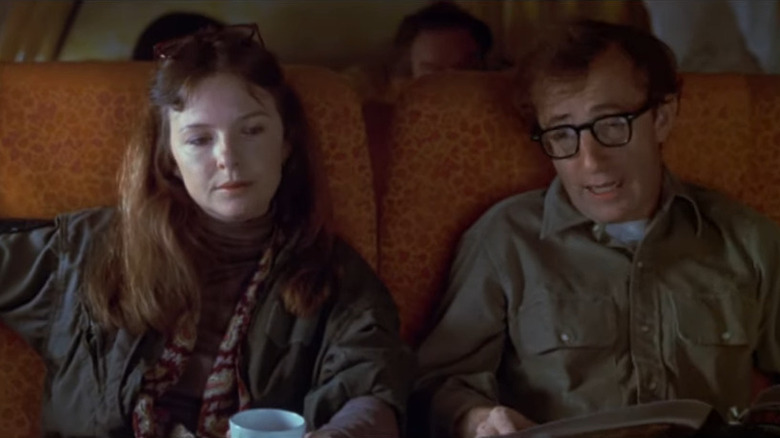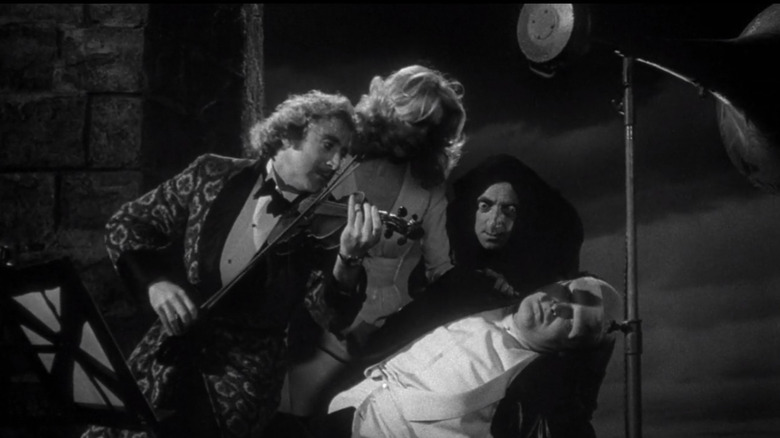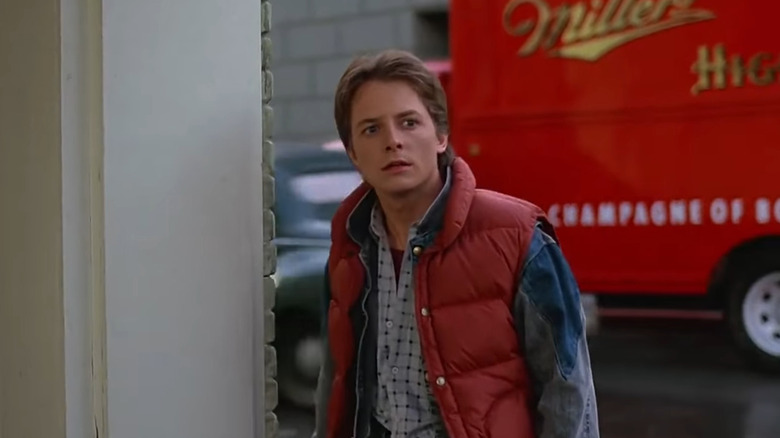The Six Movies Quentin Tarantino Thinks Are Perfect
Quentin Tarantino is one of the most beloved directors in the business today. While countless directors are in the industry's upper echelons, few of their releases constitute an event the way Tarantino's do. With films like "Reservoir Dogs," "Pulp Fiction," "Django Unchained," and "Once Upon a Time in Hollywood," the legendary filmmaker knows what it takes to be successful in Tinsel Town. And, of course, if someone knows what it takes to be successful, you tend to listen when they talk about what they consider a perfect movie.
On an appearance on Jimmy Kimmel Live in October 2022, while promoting his book, "Cinema Speculation," Tarantino addressed what he considered the perfect movie. "Well, there's not many of them. That just bemoans the fact that the film art form is hard. Look, when you say perfect movies, you're talking about any individual person's aesthetic, but even trying to account for all aesthetics, the perfect movie kind of crosses all aesthetics to one degree or another. Might not be your cup of tea, but there's nothing you can say to bring it down."
Tarantino didn't stop there. After he revealed there weren't many films he considered perfect, he listed a handful of films that he presents as beyond reproach. Here are the six films that Quentin Tarantino considers perfect.
The Texas Chain Saw Massacre (1974)
It will become clear as this list goes on that Quentin Tarantino has a love for the horror genre. The first of three horror films on the list is a low-budget installment that changed the landscape of horror movies, "The Texas Chain Saw Massacre." In 1974, the world was in a time of transition. Long gone was the post-WWII thriving economy of the '50s. In its place was the turmoil created by the events of the '60s, including the Vietnam War and the assassinations of John F. Kennedy, Robert Kennedy, and Martin Luther King Jr.
The film industry coped by creating an outlet for pent-up anxiety, stress, and anger in the form of slasher films. "The Texas Chain Saw Massacre" contributed to the new horror sub-genre by creating Leatherface, one of the first and most terrifying horror villains in history. Taking place in the rural south, a group of teenagers comes face-to-face with an evil that is unlike anything moviegoers had ever seen to that point. With brutal deaths like being left to die hanging on a hook or multiple chainsaw deaths, the film brought a new kind of viewing experience for fans everywhere. (Making the film was a nightmare.)
Tarantino's list is one that has multiple horror films on it, with each one changing the landscape of the genre. "Texas Chain Saw Massacre" is the perfect start to a list of perfect movies.
Jaws (1975)
It is difficult to understate how important "Jaws" is to the film industry. While it became the origin for the killer animal films that include "Ghost in the Darkness," "Anaconda," "Cujo," and "Arachnophobia," it also single-handedly created a stereotype that sharks still can't get past. Of course, there is most likely a natural instinct to stay away from giant underwater predators with the teeth of dinosaurs. But it was difficult even to enter the water after "Jaws" became a cultural phenomenon.
While Quentin Tarantino may view this as a perfect film, the making of the film was anything but. When speaking with Entertainment Weekly back in 2011, director Steven Spielberg commented on his overconfidence going into the film. "I was pretty naïve about mother nature, and the hubris of a filmmaker who thinks he can conquer the elements was foolhardy, but I was too young to know I was being foolhardy when I demanded that we shoot the film in the Atlantic Ocean and not in a North Hollywood tank." He went on to say that he believed working in the ocean was exactly what needed to happen for the film, but it definitely threw him some curveballs.
Working in the ocean wasn't the director's only issue, as he also had the unfortunate benefit of the shark malfunctioning. While that may not sound beneficial, Spielberg said, "The shark not working was a godsend. It made me become more like Alfred Hitchcock ... When I didn't have control of my shark, it made me kind of rewrite the whole script without the shark. Therefore, in many people's opinions, the film was more effective than the way the script actually offered up the shark." Without the shark issues, it sounds like the film might not have made it to Tarantino's list.
The Exorcist (1973)
Speaking of changing the landscape of horror in film, the third and final horror selection on Quentin Tarantino's list is one of the most famous in history, "The Exorcist." With the distinction of being the first horror movie ever to win an Oscar, it is no wonder this film finds its way on his list for perfect cinema. According to the legend reported by Insider, "The Exorcist" was so scary that theaters had to hand out sick bags and reported people fainting from the experience.
Speaking to Far Out Magazine in 2022, director William Friedkin revealed that out of all the films he has done, "The Exorcist" was the most difficult in many ways. "The most challenging was 'The Exorcist,' of course. I don't think about filmmaking in terms of enjoyment. It's very, very hard work, mentally and physically, to try and achieve one's fantasies on film on what is essentially a two-dimensional medium, to try and suggest depth –- not simply depth of character and story but depth on the screen. There [are] so many problems with associating with putting something on film –- creative and technical problems –- that one doesn't have time to enjoy it, really. I can't ever say the experience was enjoyable; the editing is what I enjoy."
There is no shortage of rumors and legends about what was going on behind the scenes that make this film even more intriguing. But one thing is not a rumor or a legend. "The Exorcist" is one of the most terrifying movies of all time and a perfect addition to Tarantino's list of perfect films.
Annie Hall (1977)
Woody Allen is one of the last half-century's most well-known and divisive directors. With a filmography that celebrates the exploration of love, "Annie Hall" arguably celebrates that theme the most. It not only won four Oscars — for best screenplay, director, actress, and picture — it also reinvigorated the romantic comedy. It is jam-packed with classic Woody Allen one-liners and one of the funniest scenes of his career with the "cocaine sneeze." Of course, a lot goes into a film, but one of the things that may feel small is the title. "Annie Hall" almost had a different title, with Allen revealing in a 1994 interview with Take 2 Mark that the process of picking a title was a long one.
"Originally, Marshall Brickman and I wrote that, and we called it 'Anadonia.' Which is a fancy psychological word for a state wherein one cannot experience pleasure in anything," Allen said. "The film company just didn't want that title for that movie. They thought we had a likable movie and an accessible movie, and to burden it with an odd and negative title, they thought it was a mistake. We went through a lot of attempts, we called it 'Sweethearts' for a while, but then there was another film called 'Sweethearts,' and so we couldn't get that title. We had a number of titles for it, and finally, we were getting down to the last weeks, and I said, 'Why don't we just call it 'Annie Hall'?' and that was it."
Out of all the films that Quentin Tarantino could pick for his perfect list, he has chosen a fair amount of legendary contemporary directors. "Annie Hall" is a perfect fit since it is the perfect choice from Allen's filmography.
Young Frankenstein (1974)
Mel Brooks is a comedic genius, with his parodies crossing numerous genres and stories, including "Spaceballs," "Robin Hood: Men in Tights," and "Blazing Saddles." One of the most beloved comedies of all time came from the mind of Brooks and followed the noir thriller written by Mary Shelley, "Young Frankenstein." There are numerous reasons this film has stood the test of time, but one of the main reasons is that it is ranked near the top of Brooks' best films, almost single-handedly creating the parody film.
One thing about "Young Frankenstein" that makes it unique among other parodies is that no one loves it more than the cast. In an interview with Jake's Takes, Cloris Leachman (who played caretaker Frau Blücher) told a story about how she made the legendary comedic actor Gene Wilder laugh for numerous takes. "Everything I did in the movie ticked Gene to pieces. And it was so much fun to work with him," the late actress said. She spoke about one particular scene that involved her begging the others to stay close to an unlit candelabra because the stairs can be treacherous. "We did about 15 takes. I hear him laughing, and I have not said anything. I just tickled him to pieces."
The parody film may be a thing of the past, but not before Gene Wilder and Mel Brooks co-wrote one of the films that established a new (albeit relatively short-lived) comedy sub-genre. Another trailblazing choice by Quentin Tarantino and another fitting addition to his list of perfect films.
Back to the Future (1985)
Robert Zemeckis gave us the favorite film for an entire generation when he sent Marty McFly (Michael J. Fox) and his friend Doc Brown (Christopher Lloyd) back to 1955 in "Back to the Future." While it is funny, adventurous, and has a theme song that will bury itself in your head and not leave for days at a time, there are other things about the film that help it last forever. The sci-film showed fans that the genre didn't have to be scary, violent, or even overly serious.
But what made this movie so much fun was watching the two stars chew up the scenes together. Surprisingly enough, Fox and Lloyd didn't become friends until the final film, as the former told Variety in an interview. "Chris is a great guy. He's very enigmatic," Fox said. "It took me a few films to get to know him. On 'Back to the Future Part III,' we connected in a way we hadn't on the other films. I came to see how much he loved acting. I never got that before. To sit down and talk about acting and talk about Shakespeare and 'King Lear'... This guy can play King Lear! People don't expect that of him. He's full of surprises."
Interestingly, the six movies that Quentin Tarantino believes are perfect all take place in just over a decade's time, from the mid-70s to the mid-80s. Three horror movies, one rom-com, one parody, and one time-traveling adventure. They may all feel very different, whether in tone, subject matter, or composition, but in two places they are the same. One is that all of them are trailblazers in their own right. The other is that they are all objectively perfect in Quentin Tarantino's mind.
